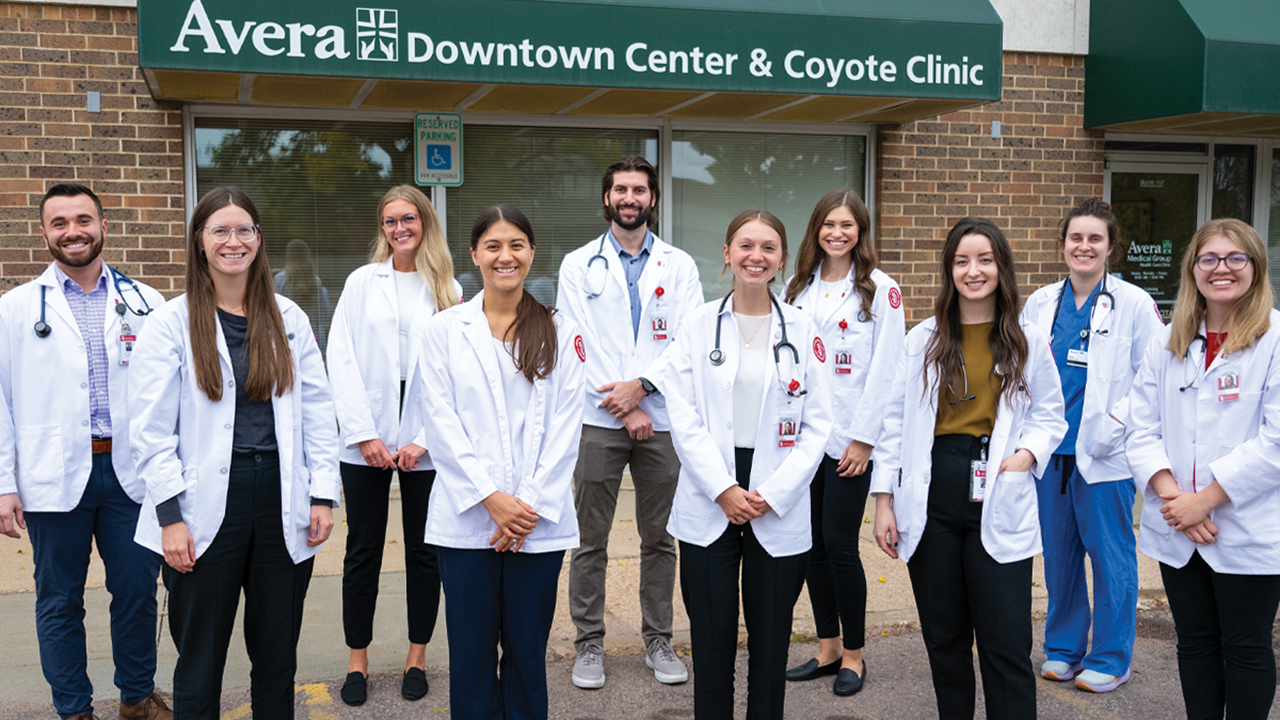Coyote Clinic Fills a Need, Provides Experience

What began in 2006 as a small group of students holding a monthly clinic night has evolved into a well-known Sioux Falls resource spearheaded by an 18-person student steering committee.
The 100% volunteer-based clinic has now grown to offer weekly internal medicine clinic nights, monthly psychiatry clinic nights and a bimonthly pop-up clinic at the Bishop Dudley Hospitality House (BDHH). Additionally, the clinic hosts numerous outreach events, volunteer opportunities, and ongoing research and health quality improvement projects. Through these various programs, the clinic has impacted hundreds of uninsured patients, with almost 60% of them speaking a non-English primary language.
“Coyote Clinic has become one of my most meaningful experiences,” said third-year medical student Cole Tessendorf, who currently serves as the Coyote Clinic’s vice chair. “I saw my first real patient as a medical student during Coyote Clinic. In terms of working with diverse patient populations, leadership opportunities and personal development, the Coyote Clinic experience is really second to none.”
For almost two decades, Coyote Clinic has empowered medical students to serve in a primary care role to patients while under the supervision of local physicians. It has also fostered a commitment to community service and acted as an opportunity for medical students to develop as leaders.
Third-year medical student Tiffany Bender received her Master of Public Health from USD prior to medical school, and Coyote Clinic was the perfect opportunity to integrate her passion for public health during medical school. She now serves as chair and oversees multiple initiatives within the committee.
“One of my favorite things about the Coyote Clinic is seeing the passion medical students have to serve their community,” Bender said. “The committee and I are so grateful to have the opportunity to continue the Coyote Clinic’s legacy this year to bridge the gap between public health and medical care.”
Some key moments of growth included adding pre-medicine undergraduate students to the volunteer pool in 2018 and implementing an on-call model in 2022, where patients can present for walk-in and acute care services during clinic nights without scheduled appointments. More recently, in 2023, USD nursing students were integrated to provide additional interdisciplinary partnership opportunities.
The student-run clinic is overseen by three physician faculty advisors. While medical students conduct the majority of the clinic’s day-to-day operations, faculty advisors are available for administrative and legal guidance. All advisors are also regular attending volunteers.
Dean of Medical Education Dr. Mark Beard has served as the faculty advisor and medical director of the Coyote Clinic since 2015. “The dedication of the students who lead this experience, the support of its staff, and the energy of each clinic is invigorating. It is so powerful to see the impact this clinic can make,” he said.
“I cannot tell you how many times I have witnessed a patient come and be able to receive the needed tests, examinations and medications to help improve his or her care and quality of life, and to see the joy and satisfaction in the eyes of all involved is so rewarding,” Beard said. “This is a service to our patients, our students and our community.”
Coyote Clinic Services
The internal medicine clinic occurs every Tuesday night at the Avera Downtown Clinic, where services in primary care, acute care and sports physicals may be provided. All necessary labs can be collected on site and physician supervisors may write prescriptions as needed.
On a clinic night, the team typically consists of an attending physician, an internal medicine resident, Coyote Clinic committee members, medical student volunteers, nursing students, a nursing faculty supervisor, a pre-medicine undergraduate student and Avera Downtown Clinic staff members.

In 2019, the Coyote Clinic partnered with psychiatrists from Avera Behavioral Health to address psychiatric care for both adolescents and adults. The psychiatry clinic occurs the first Wednesday of each month at the Avera Downtown Clinic, and the workflow is similar to the internal medicine clinic night.
The BDHH is a non-profit organization founded in 2015 that provides support services, resources and shelter to the poor and homeless community members of Sioux Falls. Recognizing that transportation, physical access and health care costs are major barriers for residents of BDHH, the Coyote Clinic instituted a satellite clinic on-site at BDHH in February 2022. This outreach triage clinic holds bimonthly pop-up clinic night, and it is currently the only scheduled clinic night outside the walls of the Avera Downtown Clinic.
In addition to the clinic nights, student committee members also oversee and implement research and quality improvement projects that have been presented at national conferences and published in peer-review journals, such as the Journal of Student Run Clinics. Additionally, they also conduct outreach events across South Dakota including flu shot drives and screening events at local food shelters, the Health Connect Fair, Turner County Fair and Feria de Salud.



